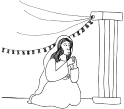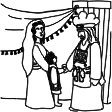1 Samuel
Active Faith For Stressful Times
1:1 - 2:10
Nahum 1:7
The LORD is good, a strong hold in the day of trouble; and he knoweth them that trust in him.
KJV
God rewards patient faith in Him.
related reading
Psalm 37:1-9, 39, 40
Psalm 69:30-36
Psalm 127
Romans 8:31-39
2 Corinthians 12:1-10
The content of the Holy Bible is a contrast. The Apostle John calls it light and dark (John 1:4,5). Moses speaks of the choice of life or death (Deut 30:19). The choice is sometimes viewed as good versus evil. At its root, it is a conflict between God and Satan. It is the way of faith or the way of sin.
First Samuel is a book of such contrasts. At times, the presentation is broad and one must read many chapters to glimpse the differences. At other times, the choices are compactly packaged and hit us squarely between the eyes. Either way, the expectation of the prophetic writer of First Samuel calls upon each of us to respond as did Joshua –
 |
And if it seem evil unto you
to serve the LORD, choose you this day whom ye will serve; whether
the gods which your fathers served that were on the other side of
the flood, or the gods of the Amorites, in whose land ye dwell:
but as for me and my house, we will serve the LORD. |
When were you last faced with such a choice? How did you respond? |
Historically we must remember that the Nation of Israel is not a nation. It is, rather, a collection of clans, each with their own geographical area and outlook. The clans are held together by the occasional remembrance of the promises of God and the Levitical priesthood. If the reader thinks back on the period of the Judges, he will not be surprised at the corrupt and weak state of the priests as we find them in these chapters.
The Good Wife [1:1-9]
The Tabernacle of God resides at Shiloh. There Eli serves as High Priest and it is to Shiloh that Elkanah journeys annually to offer worship to the Lord. Like all good Israelite men, Elkanah is conscious of his need to produce offspring. In this society, the failure to have children is a badge of disgrace. Elkanah has two wives. Hannah is barren. As a result, the second wife, Peninnah, picks on her unmercifully (1:1-7).
 |
Jewish men were required to appear at Shiloh three times a year to observe national feasts (Exod 23:14-19; 34:23; Deut 16:16,17). |
 |
James preaches in his second chapter about the need not to show prejudice or favoritism within the church. Yet, here is a prime example of God’s people doing just that. Hannah is an outcast within her family and viewed as a drunkard (1:13,14) primarily because of her barrenness and the manner in which she entreats the Lord. |
 |
Hannah is not the only barren heroine of Scripture. Think of Sarah, Samson’s mother, and Elizabeth the mother of John. God works in us in a fashion which demands that we recognize His power at work in our lives. |
| When was the last time this power worked in you? |
Scripture teaches that monogamous marriage is God’s will for man (Gen 2:24; Matt 19:4-6; Eph 5:31). Polygamy was first practiced by Lamech (Gen 4:19), a wicked descendant of Cain. After the Mosaic law was instituted, primarily wealthy individuals practiced polygamy, as the law regulated marriage and divorce, protecting women. At the same time polygamy allowed a man to take a second wife to produce children if his first wife was infertile (Gen 16:1-3; 30:3, 4, 9, 10). This is the situation here involving Hannah, Elkanah, and Peninnah.
 |
Submit Yourself to God [1:10-28] |
Hannah submits herself to God. She makes a vow related to her barrenness (1:10,11). If God will give her a son, she shall dedicate him to the Lord as a Nazarite.
| How often do we find ourselves bargaining with God in prayer? |
Hannah carries out her vow – what about you?
 |
In Israel the Nazarite was one who separated himself from others by consecration to Yahweh with a special vow. The origin of the practice is pre-Mosaic and obscure. Although chronologically not the first biblical reference to the subject, the rules for the Nazarite outlined in Numbers 6 provide the fullest and most convenient basis for discussion. The legislation has three sections which contain prohibitions against wine and strong drinks, not cutting his hair, and not going near a dead body. Although the Numbers legislation ran only for a specific length of time, it is clear that a child, such as Samson and Samuel, could be dedicated to the Lord for life. |
Hannah’s daily and on-going concern was for her family relationship and her failure to produce a child. She brought this concern to God. Christians should bring their daily concerns to God and not wait for a crisis before turning to prayer.
| Samuel means “Given over to the Lord.” He was the child “asked of the Lord” (1:11) and Hannah, who asked for a child in faith, responds to the fulfillment of her prayer in faith. Under Jewish customs of the time Samuel would have been at least two and more likely three years of age before Hannah brought him to Eli. Samuel is turned over to Eli as being dedicated to the Lord. Samuel probably lived in the tabernacle in rooms allocated for that purpose. |  |
 |
Note that 1 Chronicles 6:33-38 tells us that Elkanah was a Levite, so Samuel’s service as a priest is proper. |
How do people in our society view having children today? How do these views differ from Hannah’s? |
Children Today
Hannah’s example is an answer to the question of whether or not a couple should bring children into this evil world. The family is a divine institution, created and ordained by God. This makes the family good in any age under any conditions. The believing family has one goal and purpose – to bring glory to God. Having godly offspring furthers God’s work on earth. As will be seen in the next lesson, and as was demonstrated throughout the book of Judges, Hannah’s day was no different than ours. It, too, was a day of lawlessness and sin. Still, Hannah recognized and desired children. She realized, that when dedicated to God, these children could do a powerful work in God’s kingdom.
Praise [2:1-10]
Hannah’s heart bursts forth in praise. Gratitude is a great attitude to cultivate. Her “Magnificat” is found in verses 1-10 of chapter 2. Full of praise and worship, Hannah focuses her adoration upon the true source of all blessings – God Almighty. Samuel’s birth is no everyday event. Samuel will be no every day person. The history of Israel has changed forever with Samuel’s birth.
 |
Hannah’s song is often viewed as the forerunner of Mary’s Magnificat found in Luke 1:46-55. Take a moment to compare the two by reviewing the comparison chart of the two hymns which is on the following pages. Here are two of the truly great songs of praise to our Lord and God. They should set a pattern for your own praise. |
 |
Elkanah portrays the godly man who will obey the law despite the evilness displayed by those in charge (Eli’s sons). Hannah portrays the godly women, taking her burden to God and enduring quietly the pain of bad relationships. This lesson brings home the picture of how God brings about His blessings and manifests His grace in the midst of sorrow, suffering, and human weakness. |
When was the last time you praised God? When was the last time you should have praised God? |
